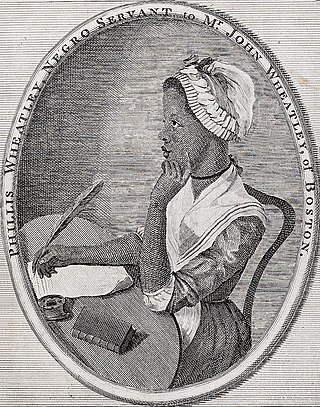
Phillis Wheatley Peters, also spelled Phyllis and Wheatly was an American author who is considered the first African-American author of a published book of poetry. Born in West Africa, she was kidnapped and subsequently sold into slavery at the age of seven or eight and transported to North America, where she was bought by the Wheatley family of Boston. After she learned to read and write, they encouraged her poetry when they saw her talent.
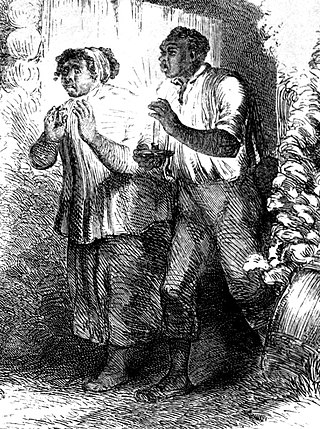
Uncle Tom is the title character of Harriet Beecher Stowe's 1852 novel Uncle Tom's Cabin. The character was seen in the Victorian era as a ground-breaking literary attack against the dehumanization of slaves. Tom is a deeply religious Christian preacher to his fellow slaves who uses nonresistance, but who is willingly flogged to death rather than violate the plantation's code of silence by informing against the route being used by two women who have just escaped from slavery. However, the character also came to be criticized for allegedly being inexplicably kind to white slaveowners, especially based on his portrayal in pro-compassion dramatizations. This led to the use of Uncle Tom – sometimes shortened to just a Tom – as a derogatory epithet for an exceedingly subservient person or house negro, particularly one accepting and uncritical of his or her own lower-class status.
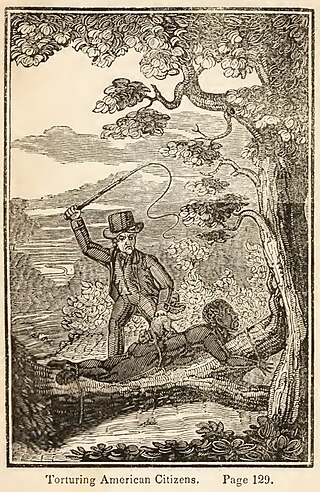
The legal institution of human chattel slavery, comprising the enslavement primarily of Africans and African Americans, was prevalent in the United States of America from its founding in 1776 until 1865, predominantly in the South. Slavery was established throughout European colonization in the Americas. From 1526, during the early colonial period, it was practiced in what became Britain's colonies, including the Thirteen Colonies that formed the United States. Under the law, an enslaved person was treated as property that could be bought, sold, or given away. Slavery lasted in about half of U.S. states until abolition in 1865, and issues concerning slavery seeped into every aspect of national politics, economics, and social custom. In the decades after the end of Reconstruction in 1877, many of slavery's economic and social functions were continued through segregation, sharecropping, and convict leasing.

John Gabriel Stedman was a Dutch States Army officer and writer best known for writing The Narrative of a Five Years Expedition against the Revolted Negroes of Surinam (1796). This narrative covers describes his experience in Suriname between 1773 and 1777, where he was a soldier in a Dutch regiment deployed to assist colonial troops fighting against groups of Maroons. He first recorded his experiences in a personal diary that he later rewrote and expanded into the Narrative. The Narrative was a bestseller of the time and, with its firsthand depictions of slavery and other aspects of colonialism, became an important tool in the fledgling abolitionist movement. When compared with Stedman's personal diary, his published Narrative is a sanitized and romanticized version of Stedman's time in Surinam.

Slavery in Canada includes historical practices of enslavement practised by both the First Nations until the latter half of the 19th century, and by colonists during the period of European colonization.

Olaudah Equiano, known for most of his life as Gustavus Vassa, was a writer and abolitionist. According to his memoir, he was from the village of Essaka in modern southern Nigeria. Enslaved as a child in West Africa, he was shipped to the Caribbean and sold to a Royal Navy officer. He was sold twice more before purchasing his freedom in 1766.

Thomas Day was a British author and abolitionist. He was well known for the book The History of Sandford and Merton (1783–1789) which emphasized Rousseauvian educational ideals, for his writings against slavery, for campaigning both for and against American independence, and for his project applying his educational ideals to young girls with the aim of raising a wife for himself.
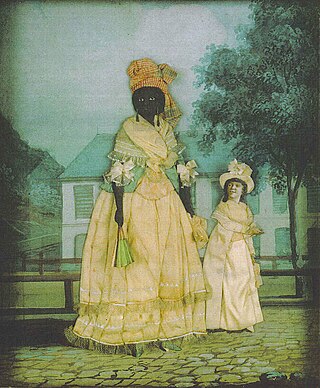
In the British colonies in North America and in the United States before the abolition of slavery in 1865, free Negro or free Black described the legal status of African Americans who were not enslaved. The term was applied both to formerly enslaved people (freedmen) and to those who had been born free, whether of African or mixed descent.
African American literature is the body of literature produced in the United States by writers of African descent. Olaudah Equiano was an African man who wrote The Interesting Narrative of the Life of Olaudah Equiano, an autobiography published in 1789 that became one of the first influential works about the transatlantic slave trade and the experiences of enslaved Africans. His work was published sixteen years after Phillis Wheatley's work. She was an enslaved African woman who became the first African American to publish a book of poetry, which was published in 1773. Her collection, was titled Poems on Various Subjects, Religious and Moral.

Scipio Moorhead was an enslaved African-American artist who lived in Boston, Massachusetts. Moorhead is known through the contemporary African-American poet Phillis Wheatley's poem, dedicated "To S. M. a young African Painter, on seeing his Works", published in Poems on Various Subjects, Religious and Moral, 1773. His full name was learned from period marginalia.
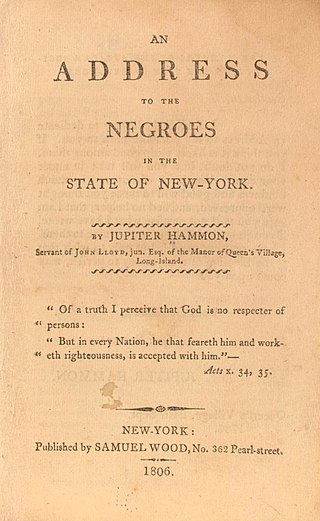
Jupiter Hammon was an American writer who is known as a founder of African-American literature, as his poem published in 1761 in New York was the first by an African American man in North America. He subsequently published both poetry and prose. In addition, he was a preacher and a commercial clerk on Long Island, New York.
Nationality words link to articles with information on the nation's poetry or literature.

Poems on Various Subjects, Religious and Moral by Phillis Wheatley, Negro Servant to Mr. John Wheatley, of Boston, in New England is a collection of 39 poems written by Phillis Wheatley, the first professional African-American woman poet in America and the first African-American woman whose writings were published.

This timeline of events leading to the American Civil War is a chronologically ordered list of events and issues that historians recognize as origins and causes of the American Civil War. These events are roughly divided into two periods: the first encompasses the gradual build-up over many decades of the numerous social, economic, and political issues that ultimately contributed to the war's outbreak, and the second encompasses the five-month span following the election of Abraham Lincoln as President of the United States in 1860 and culminating in the capture of Fort Sumter in April 1861.

Albery Allson Whitman (May 30, 1851 – June 29, 1901 was an African-American poet, minister and orator. Born into slavery, Whitman became a writer. During his lifetime he was acclaimed as the "Poet Laureate of the Negro Race". He worked as a manual laborer, school teacher, financial agent, fundraiser and pastor. He died in Atlanta in 1901 of pneumonia.

In the United States, abolitionism, the movement that sought to end slavery in the country, was active from the colonial era until the American Civil War, the end of which brought about the abolition of American slavery, except as punishment for a crime, through the Thirteenth Amendment to the United States Constitution.
John Bicknell, the elder, was an English barrister and writer. He was co-author with Thomas Day of the abolitionist poem The Dying Negro from 1773. Bicknell has also been credited with Musical Travels through England, a pseudonymous satire on Charles Burney.
Sarah Louisa Forten Purvis (1814–1884) was an American poet and abolitionist from Philadelphia, Pennsylvania. She co-founded The Philadelphia Female Anti-Slavery Society and contributed many poems to the anti-slavery newspaper The Liberator.
Mary Birkett Card, was an Irish based British poet, abolitionist, and feminist, best remembered for her anti-slavery poem, A Poem on the African Slave Trade published when she was seventeen.













